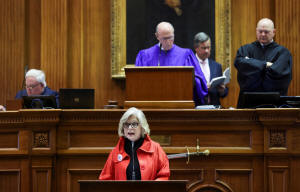South Carolina's top court upholds state's 'heartbeat' abortion ban
 Send a link to a friend
Send a link to a friend
 [August 24, 2023]
By Brendan Pierson [August 24, 2023]
By Brendan Pierson
(Reuters) - South Carolina's highest court on Wednesday upheld a new
state law banning abortion after fetal heart activity is detected,
usually around six weeks of pregnancy, months after it blocked a similar
ban.
In a 4-1 ruling, the South Carolina Supreme Court found that the state
constitution's protection against "unreasonable invasions of privacy"
did not include a right to abortion, and that the state law was "within
the zone of reasonable policy decisions rationally related to the
State's interest in protecting the unborn."
"With this victory, we protect the lives of countless unborn children
and reaffirm South Carolina's place as one of the most pro-life states
in America," South Carolina Governor Henry McMaster, a Republican, said
in a statement.
The state legislature passed the hotly contested bill in May, mostly
along party lines, with the notable exception of the state Senate's five
women members - three Republicans, a Democrat and an independent - who
all opposed it.
"Today's state Supreme Court decision will have profound impacts on
basic healthcare in South Carolina and across the region, where access
for so many has already been cut off," Planned Parenthood President
Alexis McGill Johnson said in a statement.

The heartbeat, or six-week, cutoff comes before many women even realize
they are pregnant.
The new law came after the state Supreme Court in January struck down a
previous abortion law, by a 3-2 vote.
The author of that ruling, Justice Kaye Hearn, has since retired. South
Carolina's Republican legislature in February replaced Hearn, who was
the sole woman on the five-member court, with Justice Garrison Hill, who
voted to uphold the new law on Wednesday.
[to top of second column]
|

South Carolina Republican state senator
Katrina Frye Shealy debates a six-week abortion ban at the state
legislature in Columbia, South Carolina, U.S. May 23, 2023.
REUTERS/Sam Wolfe/File Photo

Justice John Few also switched his vote, finding that the new law
addressed gaps in the old one by explaining the legislature's
rationale more fully and by requiring health insurance plans to
cover contraception.
Chief Justice Donald Beatty dissented, saying the new law was
essentially the same as the previous one that the court had struck
down and that the court should have followed its earlier finding.
"Today's result will surely weigh heavily upon the public and our
state's medical professionals, in light of the threat of criminal
penalties placed upon practitioners and the serious harm that could
occur to women who could be denied reproductive healthcare during
this uncertainty," he wrote
The U.S. Supreme Court last year overturned its landmark Roe v. Wade
ruling that had legalized abortion nationwide.
Since then, at least 15 of the 50 states have banned abortion
outright while others, including South Carolina, prohibit it after a
certain length of pregnancy, according to the Guttmacher Institute,
a research organization that supports abortion rights.
(Reporting By Brendan Pierson in New York; editing by Jonathan
Oatis, Alexia Garamfalvi and Bill Berkrot)
[© 2023 Thomson Reuters. All rights
reserved.]This material may not be published,
broadcast, rewritten or redistributed.
Thompson Reuters is solely responsible for this content.
 |